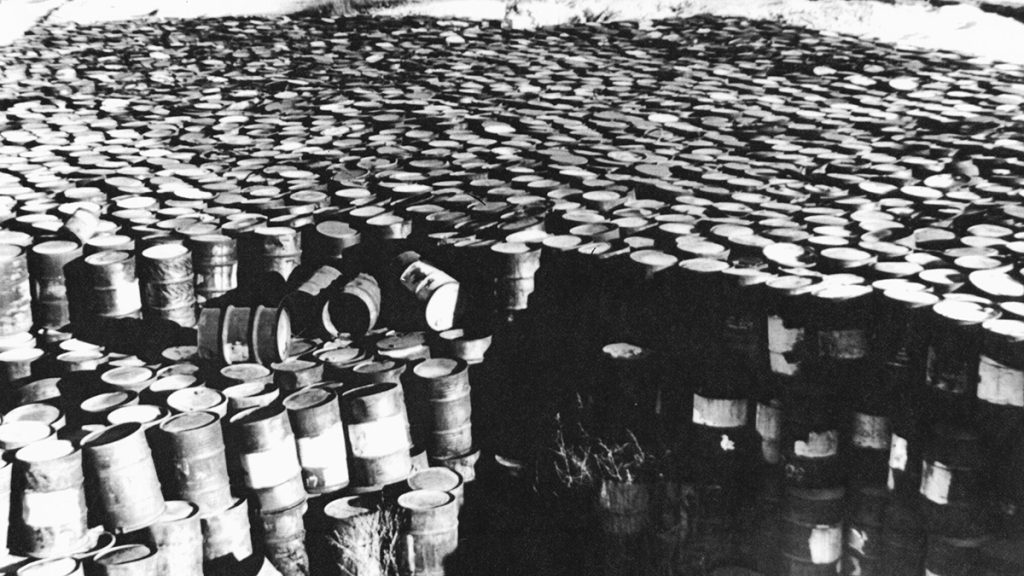IRE-Mizzou Watchdog Seminar: Uncovering radioactive pollution in St. Louis

A photo taken in 1960 of deteriorating steel drums containing radioactive residues near Coldwater Creek, by the Mallinckrodt-St. Louis Sites Task Force Working Group | State Historical Society of Missouri, Kay Drey Mallinckrodt Collection, 1943-2006
The Reynolds Journalism Institute at the Missouri School of Journalism presents a behind-the-scenes look at an explosive investigative reporting project
COLUMBIA, Mo. (Oct. 9, 2023) — On Thursday, Oct. 12, Investigative Reporters and Editors — a nonprofit journalism resource and training organization based at the Missouri School of Journalism — will host the latest IRE-Mizzou Watchdog Seminar from 12:30-1:30 p.m. in the Reynolds Journalism Institute’s Smith Forum.
The seminar will feature Jason Hancock and Allison Kite of the Missouri Independent and Derek Kravitz, BJ ’07, of MuckRock as they discuss how their organizations teamed up to expose the harms of radioactive pollution in St. Louis.
“These journalists are going to show students how they did this document-based, data-based investigation,” said David Herzog, a professor at the School of Journalism, director of data and research services at IRE and academic advisor to NICAR, the National Institute for Computer-Assisted Reporting. “This is what I love about IRE’s mission: sharing practical tips and tricks that students and professional journalists can apply in their work.”
Hancock is the editor-in-chief of the Missouri Independent, which covers state politics and other civic issues from the state capital of Jefferson City. Before the outlet’s launch in 2020, he served as the lead political reporter for the Kansas City Star.
Seminars like this are a crucial part of the School’s Missouri Method, which not only puts students into professional newsrooms but brings in masters of the craft to share inside knowledge about how this work gets done.
David Kurpius
Kite is a data reporter for the Missouri Independent and the Kansas Reflector, where she writes about energy and environmental issues.
Kravitz is the investigations and data editor for MuckRock, which helps journalists and researchers file open records requests and serves as a repository for government documents obtained through such requests.
Together, the three will offer insights into a collaborative process — which also included contributions from the Associated Press — that resulted in a series of bombshell reports about unremedied radioactive waste in St. Louis, revealing that federal officials knew about the dangers as early as 1949 but failed to act.
“Seminars like this are a crucial part of the School’s Missouri Method, which not only puts students into professional newsrooms but brings in masters of the craft to share inside knowledge about how this work gets done,” said David Kurpius, dean of the School of Journalism. “This is how we train the next generation of collaborative, community-minded journalists.”
Randy Picht, executive director of RJI, added that there is similar congruence between RJI and IRE.
“At RJI, we are about making practical, actionable tools and information available to the journalists and newsrooms that need them,” Picht said, noting that RJI provided early funding for DocumentCloud, open-source software for searching and analyzing public documents that is now a MuckRock project . “At the same time, we recognize that you can’t solve industry-wide challenges without collaborating with innovators and sources of support all over the country. The Watchdog Seminar represents the best of both worlds.”
About IRE
Based at the School of Journalism, IRE is the nation’s leading organization for investigative reporters and hosts workshops, conferences, online training, bootcamps and custom trainings for news organizations throughout the year. Membership is open to both students and professionals. IRE’s executive director is Diana Fuentes, a veteran journalist and editor who previously served as deputy metro editor of the San Antonio Express-News.
Updated: October 10, 2023